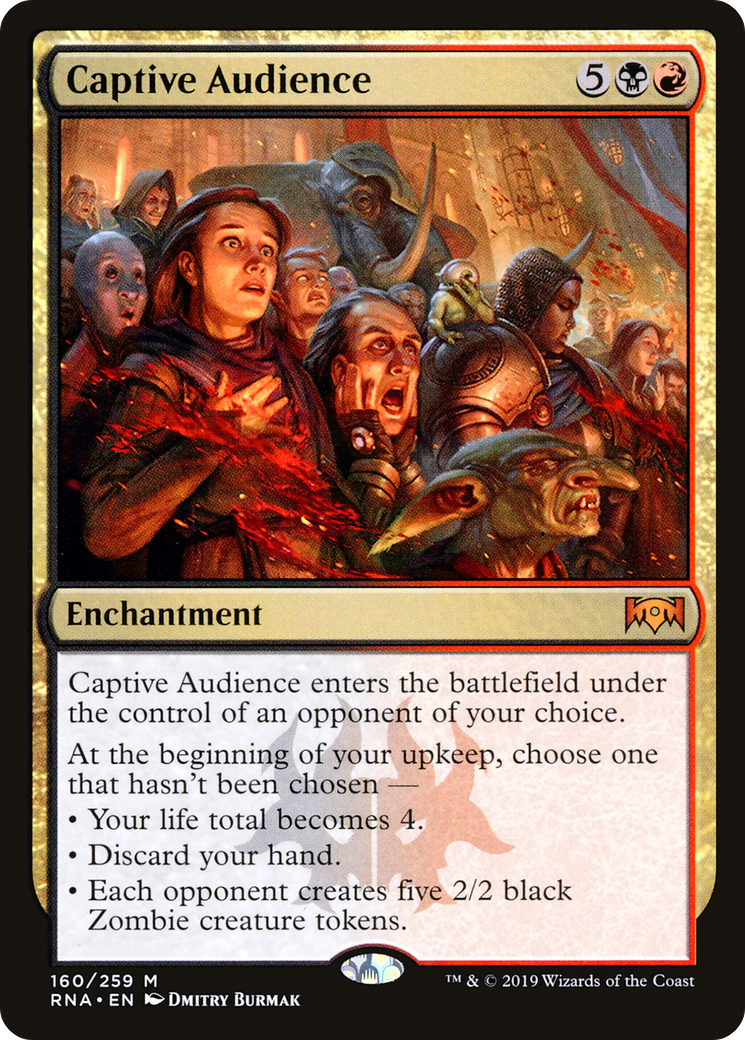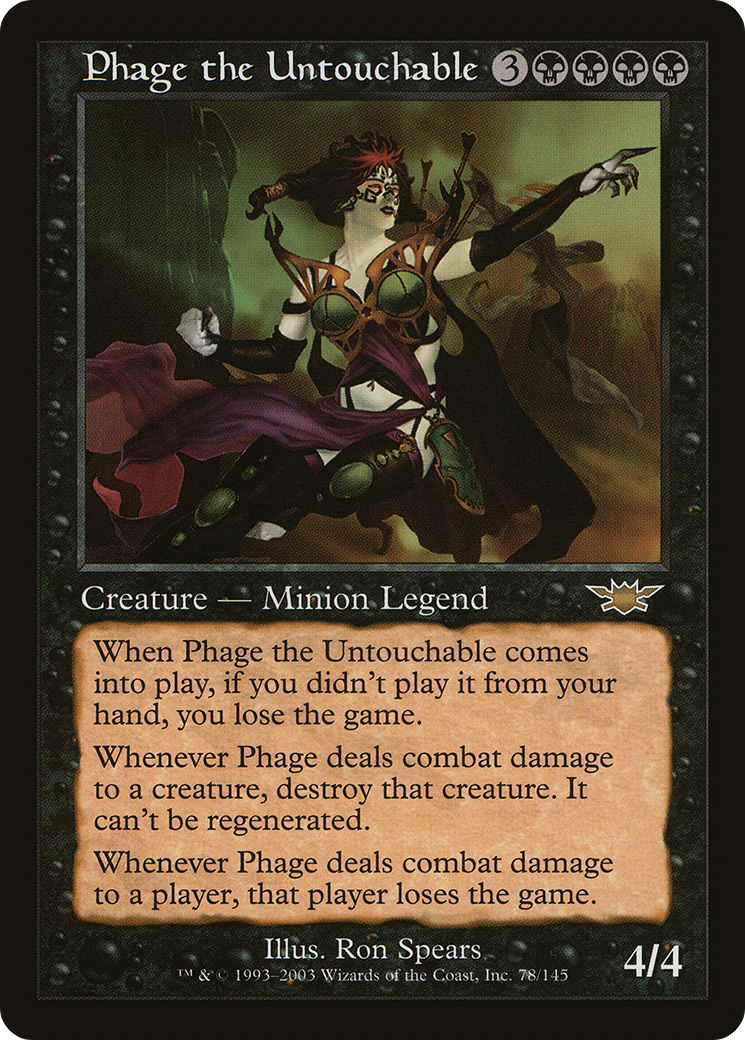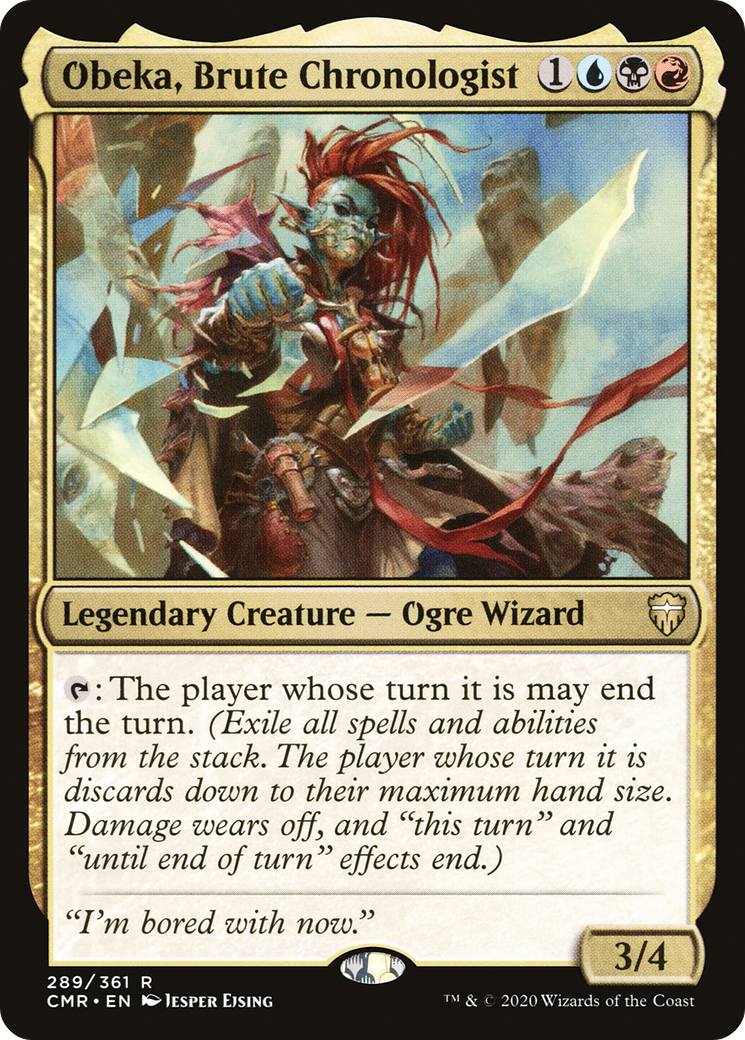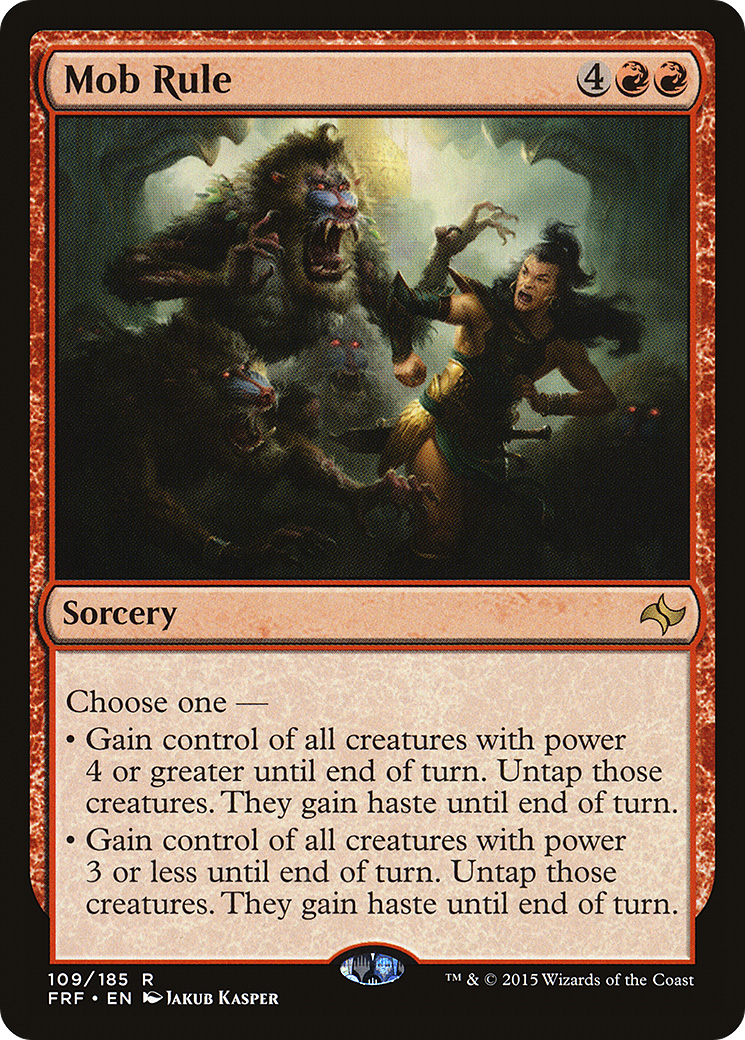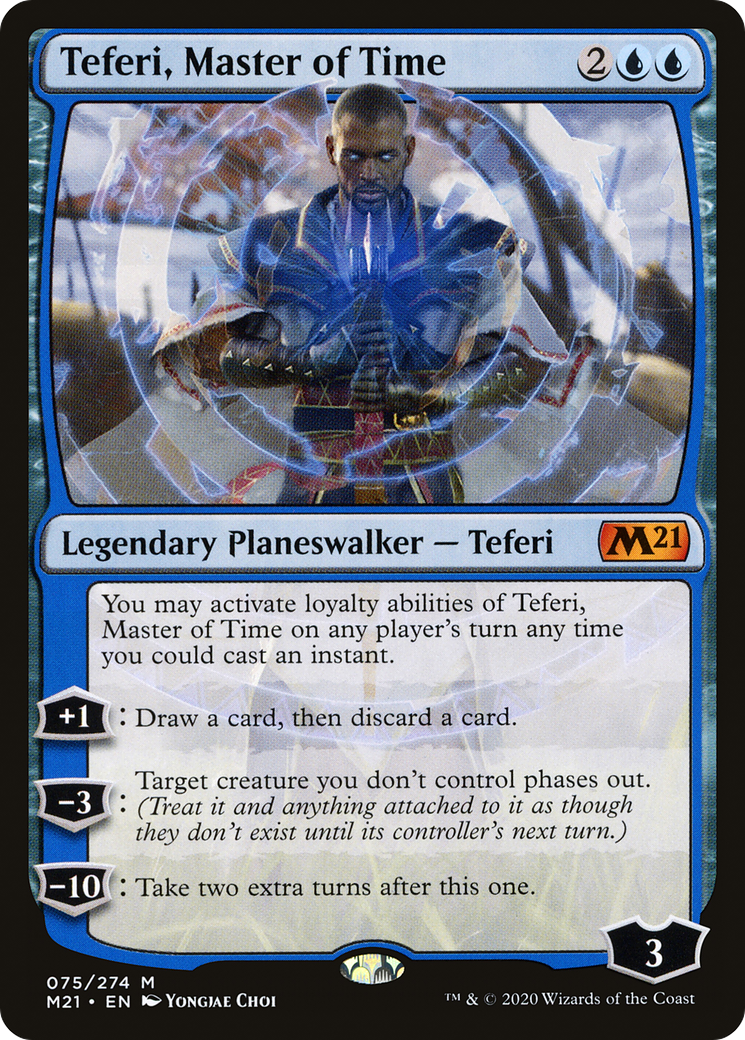Confounding Conundrums—Confusing Commander Cards
Magic is a complex game. In fact, you may have even read that Magic is the most complex game in the world. With over 20,000 cards across nearly 30 years, it should come as no surprise that even experienced players occasionally misunderstand how cards work. Some cards are extremely convoluted or just plain weird. In this article, we (Chief, floating mana and casting spells after Teferi’s Protection resolves and Exxaxl, activating Sundial of the Infinite to End the Turn) will go over some of the common cards that people misunderstand in Commander and take a deep dive into how they actually work.
If you’re a fan of Magic and webcomics, you may have heard of Cardboard Crack. We’d be lying if we said that we aren’t big fans of this series. As such, it’s only fair that we admit that we’ve procrastinated on actually writing this article for a while, due in no small part to the aggressive schedule of new Magic releases that we cover in the majority of our articles before we finally decided that enough is enough after this incredible Cardboard Crack a few weeks ago:
We’ve all been there, right? Spending money on a cool new deck idea only to discover that it isn’t going to work the way that you’ve planned is the worst! We wouldn’t wish that experience on anyone and we’re here to try to help you avoid that when building around some popular Commander cards. This is the first in what may very well wind up being an entire series of articles about confusing Magic cards.
A quick note from Chief: This article is based on the current version of the Comprehensive Rules that was released alongside Commander Legends: Battle for Baldur’s Gate on July 8, 2022. There is always the possibility that a future rules update will change something about the way that these cards work. Please, please, please don’t @ me on Twitter in 2025 and tell me that I was wrong on the Internet!
Teferi’s Protection
Since showing up in Commander 2017, this card has become a staple of casual Commander. It offers almost unparalleled protection for you and your permanents for just 3 mana, making it an easy include in most decks that feature white. Even after all of this time, people are still often confused by this card. What exactly does it do? The effects on this card are quite complex, so we’ll go over it in sections.
The first thing that Teferi’s Protection does is make it so that your life total can’t change until your next turn. This seems simple enough, but there are still some complexities involved in having your life total locked at a set number until your next turn. Let’s look at some different types of cards that can be impacted by your life total being fixed at a set number.
When your life total can’t change, this means that you can’t pay life in any amount that would reduce your life total. That means that you wouldn’t be able to cast a Toxic Deluge for any amount greater than 0, which doesn’t sound very promising. You can also just ignore a card like Torment of Hailfire entirely because the penalty for not sacrificing or discarding things doesn’t hurt you at all. You can even use this to keep your life total safe and secure when an opponent (or you) casts a Worldfire! Don’t blame us—it’s totally legal to do this!
Teferi’s Protection also gives you protection from everything until your next turn. This means that you can’t be the target of spells or abilities of any kind, damage that would be dealt to you is prevented, and auras can’t be attached to you. There are always going to be strange interactions with unusual conditions such as this one. We’ll go over some now.
You can’t be targeted by spells or abilities, but what about things that don’t target anyone? The effects of cards such as Wheel of Fortune, Scavenger Grounds, and Tasha’s Hideous Laughter aren’t targeted. Your hand, graveyard, and library are still very much in the game (more on that later) and these cards will work as normal because you aren’t protected from effects such as these.
Proliferate cards such as Atraxa, Praetors’ Voice can still give you more counters if you already have at least one, so you could become a victim of infect if you accrue 10 poison counters while under the effects of Teferi’s Protection. You can also be attacked, which means that Ulamog, the Ceaseless Hunger can still eat the top 20 cards of your library even if he normally won’t deal any damage to you. Your opponent could even choose to have Captive Audience enter the battlefield under your control, since it’s not a targeted ability and you’re still a part of the game.
If you have protection from everything, damage that would be dealt to you would normally be prevented. That said, cards like Questing Beast or the Stomp adventure on Bonecrusher Giant make damage unable to be prevented. This might not mean much since your life total can’t change, but it could open you up to lethal commander damage, infect damage, or the combat damage trigger of Phage the Untouchable as none of these conditions care about whether your life total changes!
What about alternate win or loss conditions? Can your opponent still end the game with a card like Thassa’s Oracle, Halo Fountain, or Nicol Bolas, Dragon-God? It turns out that the answer is yes. Protection doesn’t stop your opponent from winning the game if they meet the conditions to do so, such as with an alternate win condition. You’ll also likely have phased out any planeswalkers or legendary creatures that you control, so you can still lose the game if someone activates the third loyalty ability of everyone’s favorite Elder Dragon planeswalker.
The last way that Teferi’s Protection keeps you safe is by phasing out your permanents. This means that they’re treated as though they don’t exist, but they don’t actually change game zones. Phased out permanents will phase back in at the beginning of their controller’s untap step before things untap, unless there is a condition that prevents them from doing so.
Phasing things out is a great way to protect permanents from being removed, but it can also have some strange interactions! If you control a Platinum Angel and it phases out, it’s no longer preventing you from losing the game until it phases back in. If an opponent casts Expropriate, you can safely choose money if your permanents are phased out without worrying about them getting anything. You could also benefit greatly from something like Scholarship Sponsor because while your lands are phased out and it wouldn’t see them under your control!
Notably, you as a player do not phase out and neither do the cards in your hand, library, graveyard, or any other game zone aside from the battlefield. The same is true of any spells or abilities that you control on the stack. This means that you could cast Blasphemous Act, hold priority and respond to it by casting Teferi’s Protection. You could also float mana and then cast Teferi’s Protection. After it resolves, you could use this mana to cast something diabolical such as Armageddon or Obliterate, if you were so inclined. 😈
Sundial of the Infinite and Obeka, Brute Chronologist
You might notice that these cards have a lot of reminder text. This is because a lot goes into ending a turn in a game of Magic. It shouldn’t be any surprise that people are often confused by exactly how these abilities work, so we’ll go over some examples of cards that do and don’t work well with turn-ending effects.
One of the most common synergies with turn-ending effects are triggered abilities that cause something negative to happen. Yes, you can cast that Warrior’s Oath to take an extra turn and then use Obeka to end the turn while the trigger that would cause you to lose the game is on the stack! You can also use these effects to keep the tokens created by Araumi of the Dead Tide and other encore cards or myriad cards such as Elturel Survivors. This also works on a variety of other similar triggered abilities such as those created by blitz and unearth.
When you end the turn by activating an ability like that of Obeka, you proceed to the cleanup step in the process. This causes all effects that last until the end of the turn to end without using the stack. Effects ending this way do not use the stack and can’t be responded to. As such, it’s not possible to end the turn with one of these cards and keep things that you gained control of with cards such as Zealous Conscripts, Mob Rule, or Insurrection. This is one of the most common misconceptions that we run into when playing against Obeka decks online and a recurring theme that we notice when checking decks and looking at which cards people include in their list.
While there typically isn’t a round of priority during the cleanup step, sometimes things can happen that allow people to take actions during that step. This can be caused by unusual cards such as Thawing Glaciers or (significantly more often) cards such as Glinthorn Buccaneer and The Gitrog Monster putting abilities on the stack when a player discards down to hand size. When this happens, another cleanup step happens after that one and this process repeats until a cleanup step passes without anything going on the stack. We wanted to mention this because you can use turn-ending effects during the cleanup step in these circumstances, but this doesn’t allow you to prevent effects that last until the end of turn from ending.
Urza’s Saga
What could possibly go wrong with a land card that is also one of the most confusing enchantment subtypes? This card has made a splash in multiple formats based on its powerful abilities, but many players still don’t know exactly how it works. There are a few confusing things about this card, and we’ll cover them all.
As a saga, Urza’s Saga gains a counter as it enters the battlefield and at the beginning of its controller’s main phase. Each time that Urza’s Saga gains a counter in this fashion, the chapter ability that corresponds with the number of counters on it goes on the stack. This means that Urza’s Saga doesn’t normally have a mana ability, but it will gain one as soon as its first ability resolves. Easy enough, right?
A quick note from Chief: You just have to hope your opponent doesn’t destroy it at an inconvenient time such as when gaining its ability to produce mana is on the stack! I’ve had this happen to me!
One of the main things that people miss about this land is that sagas aren’t sacrificed until the conclusion of their final chapter ability. This means that you can tap Urza’s Saga for one colorless mana or activate its ability to produce a Construct token while the ability is on the stack. It will only be sacrificed as part of the conclusion of the ability resolving. Being able to float that mana before it goes away can make a big difference, but many people miss out on it.
When the final chapter of Urza’s Saga resolves, you get to search for an artifact with a mana cost of 0 or 1 generic mana and put it onto the battlefield. This makes Sol Ring a popular grab in Commander because it’s in most decks in the format. It’s important to note that Urza’s Saga specifies a mana cost and not a mana value, which means that cards such as Esper Sentinel and Walking Ballista are not on the menu because their mana costs are not in line with these requirements.
If something causes Urza’s Saga to lose its chapter abilities without removing the saga subtype, it will be immediately sacrificed as a state-based action because it has no more chapters that need to resolve. This means that red nonbasic land hosers such as the classic Blood Moon or the newer Blood Sun and Alpine Moon can be potent against Urza’s Saga while also dealing with a variety of other popular nonbasic lands in a less devastating way.
Grand Abolisher
While there’s no doubt that this card is one of the best ways to protect yourself during your own turns, it doesn’t actually stop everything. Grand Abolisher only stops opponents from casting spells or activating abilities of artifacts, creatures, and enchantments. There are a surprisingly large number of popular cards that still work perfectly fine while it’s on the battlefield. Let’s talk about a few of them.
The obvious thing that Grand Abolisher does not stop is lands. You can still activate your Strip Mine to destroy a valuable land during your opponent’s upkeep to deprive them of mana in their main phase. You can also use Mouth of Ronom to deal with Grand Abolisher or another creature. You can even activate Karakas to bounce their commander—just kidding! That last one is banned in Commander, but there are still a lot of different lands that can interact with Grand Abolisher’s controller.
You might have noticed that Grand Abolisher conspicuously doesn’t stop planeswalkers from activating their abilities. This is inconsequential most of the time, but Teferi, Master of Time is a popular planeswalker that can activate his abilities outside of normal timing restrictions! He can even use his second loyalty ability to phase out Grand Abolisher and allow for normal interaction.
It’s also important to note that Grand Abolisher can’t stop activated abilities of cards in zones other than the battlefield, even when they share a card type with the permanents that it can stop. This means that you can cycle that Gempalm Incinerator to deal damage to Grand Abolisher or cycle anything with Astral Slide in play to get rid of it on your opponent’s turns. Notably, channel lands such as Otawara, Soaring City can also be used to answer things while you’re unable to cast spells.
God-Eternal Kefnet and Miracles
These cards allow you to take a specific action when you draw a card that isn’t always intuitive. In fact, the miracle spells were controversial even in high-level organized play because of issues caused by the play patterns that they sometimes create. Of the miracle spells, Terminus and Temporal Mastery seem to show up most in the Commander format. Let’s talk about how these cards work.
As you draw your first card per turn while you control God-Eternal Kefnet or if your first card draw is a miracle spell, you may reveal that card. When you reveal an appropriate card, a triggered ability is placed on the stack that gives you permission to cast the spell following the guidelines for the specific ability (even outside of your own turn). This means that it’s possible for your opponent to respond by casting Stifle on the ability, by casting Silence, or by sacrificing a Ranger-Captain of Eos to prevent you from utilizing this ability. They simply have to do so when you pass priority on the resolution of the ability that permits you to cast the spell.
A quick note on these cards: It’s good form to reveal the card before it gets mixed in with the rest of your hand in order to avoid any confusion about whether it was, indeed, the first card that you drew during the turn. If you play cards like these, put your hand face down on the table when you draw a card making it very clear that the only card in your hand is the one you just drew from the top of your library.
God-Eternal Keftnet’s ability is a little more complicated than a miracle spell, because it actually creates a copy of the instant or sorcery card that you drew and allows you to cast it for a reduced cost. Notably, this is not the same thing as copying a spell, so the ‘whenever you copy’ clause of Kalamax, the Stormsire would not interact with the spell that you’re casting.
While Isochron Scepter and most other cards that create copies of cards allow you to cast them from exile, Kefnet allows you to cast the copy from your hand. This means that Drannith Magistrate will not prevent you from casting it.
We hope that this article has given you a satisfying look into some confusing cards that you might run into in Commander. This will most likely not be our last foray into this concept, as there are still many cards out there that tend to confuse new and old players alike! Such is the nature of a complex game like Magic.
Did you find any of these cards confusing? What are some other cards that you’ve had trouble figuring out? Let us know on Twitter! We’d love to hear from you.
Articles like these are made possible and kept ad-free by our Patreon supporters. If you’ve enjoyed this article, you can find more of our articles here. If you need something to listen to, check out our PlayEDH Radio 903.1 podcast streaming on Spotify, Apple Podcasts, or SoundCloud!
If you’re looking to play curated webcam EDH online or just want to chat with us, come join us on our Discord server. We hope to see you there!
“This article is unofficial Fan Content permitted under the Fan Content Policy. Not approved/endorsed by Wizards. Portions of the materials used are property of Wizards of the Coast. ©Wizards of the Coast LLC.”









